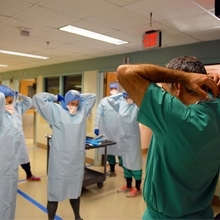Society members travel to Sierra Leone to help in the fight against Ebola
11 November 2014

Last week, the House of Commons Science and Technology Committee held a meeting ‘Ebola virus – an update’, during which Dame Sally Davies, England’s Chief Medical Officer, described how she was proud of the UK’s response to the continuing Ebola outbreak and explained how Public Health England have sent more volunteers to West Africa than the combined numbers from all other European countries.
The Society for General Microbiology is also proud of our microbiologists volunteering in the region. Journal of General Virology Editor Professor George Gao from the Chinese Academy of Sciences is currently in Sierra Leone and will shortly be joined by fellow Editor Professor Ian Goodfellow, from the University of Cambridge. Professor Goodfellow is due to leave for Makeni in Sierra Leone in the next few weeks for a five-week deployment.
Ian will be part of a larger Public Health England (PHE) team in Sierra Leone working to increase diagnostic capacity. Significant areas of Sierra Leone lack access to treatment facilities or laboratories, meaning that patients and samples have to be moved to other parts of the country. Rapid diagnoses are vital, ensuring that infected patients receive treatment and that uninfected people are not exposed to those who are.
Along with other PHE volunteers, Ian is currently undergoing a week of training at the Government’s Porton Down research site - a mock-up of the facilities they will be working in Sierra Leone to prepare them for all the techniques and safety procedures required when they reach West Africa.
Ian said of his trip: “I’ve never worked with Ebola, but I’m experienced working with the containment of infectious diseases. The risks of working with the virus in the laboratory are fairly minimal – particularly with the rigorous training we’ll receive – what worries me most is being away from my family for five weeks.
“I’ve been following the outbreak from the start. It’s been a difficult thing to watch, even more so as a virologist when you understand the disease and its transmission routes. Ebola is relatively straightforward to contain, providing you have the correct infrastructure and expertise in place. The lack of these has been a major contributing factor to why the outbreak in West Africa has been so large. I want to be part of the effort to control the disease – the easiest way for me to do so is to be on site and work with PHE as part of their efforts.
“Something that’s really stuck in my mind as a parent are the pictures of children dying of this disease on their own in hospitals. It’s very difficult to see this and not want to do something to help.”
Image: Ebola response training by Army Medicine on Flickr, under CC BY 2.0.
